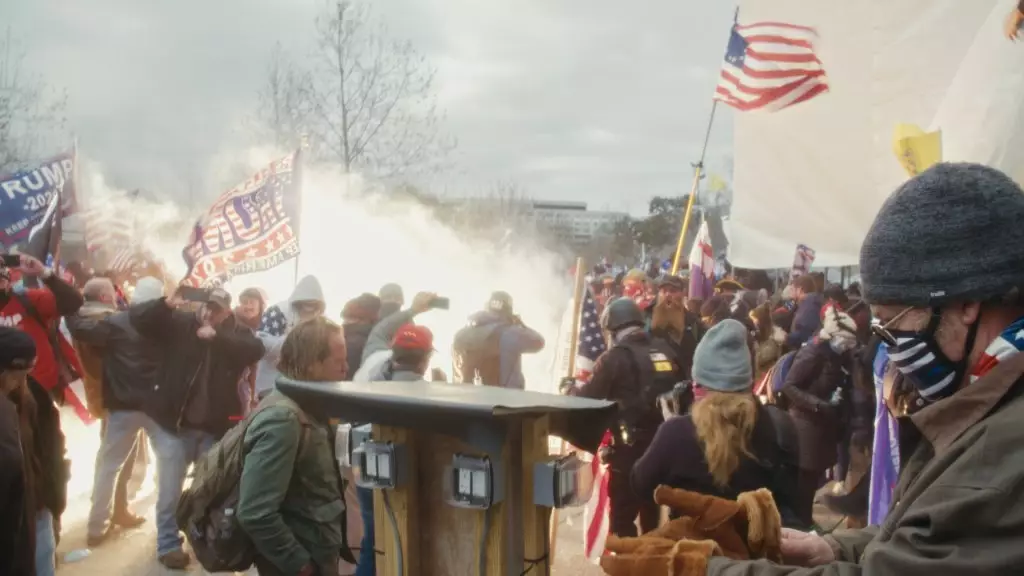The upcoming documentary, “Fight Like Hell,” serves as both a technical showcase and a historical investigation into one of the most tumultuous days in American history—the January 6 riot at the United States Capitol. Directed by Jon Long, this film promises an unprecedented look at the chaos of that day through high-definition footage captured on a RED camera, aiming to provide audiences with an immersive and unfiltered experience. Scheduled to premiere on YouTube on September 24, the documentary distinguishes itself by sidestepping the pervasive partisan narratives often associated with the events in question. Instead, it strives to present a straightforward account of the “Stop the Steal” movement and the larger context that catalyzed that fateful day.
One of the most significant aspects of “Fight Like Hell” is its emphasis on the factors leading up to the January 6 incident. By exploring the “Stop the Steal” movement from its origins, the film positions itself as an important educational tool for understanding how political dissent can escalate into violence. The documentary doesn’t merely focus on the aftermath of the riot; it delves into the strategies employed by various factions and the rhetoric that fueled their animosity toward the election results. Through compelling visuals and narratives, the filmmakers aim to contextualize the motivations behind radical actions taken by individuals who felt their democratic rights were being hijacked.
“Fight Like Hell” features notable individuals like Roger Stone, Steve Bannon, Rudy Giuliani, and Lt. Gen. Michael Flynn. Each of these figures has wielded considerable influence over the events surrounding the election and its aftermath. Their presence in the documentary provides a multi-dimensional view of the political climate that spiraled into chaos. Roger Stone, who has been pivotal to the “Stop the Steal” narrative since 2016, symbolizes the foundational elements of this movement, while Steve Bannon embodies the strategic maneuvering behind the scenes. Then there is Giuliani, a legal warrior for Trump during post-election challenges, whose role serves as a stark representation of the fusion between politics and law.
The inclusion of Flynn, who was pardoned by Trump, raises important questions about accountability and the ethics of political maneuvering during crises. Each figure contributes their lens to the collective understanding of that day—illustrating how personal motivations can intertwine with broader political objectives, and ultimately challenge democratic norms.
An Observer of Division
In his director’s statement, Jon Long articulates the complexities that have emerged from the reporting surrounding January 6. He laments the polarization and division that have continued to grow in the aftermath of the riot, suggesting that this climate has complicated the public’s understanding of the events. Long’s assertion highlights a vital narrative challenge: how can a documentary rely on genuine storytelling when audiences are enmeshed in echo chambers that reinforce their existing beliefs?
The necessity for an independent documentary, devoid of overt bias, becomes evident. Long’s vision is to present an unfiltered narrative that invites viewers to think critically about the implications of the Capitol riot while confronting their own biases. This ambitious ambition positions “Fight Like Hell” not merely as a chronicle of events but as a catalyst for dialogue and reflection within a deeply divided society.
Challenges of Interpretation
“Fight Like Hell,” with its dedication to documenting a hotly contested chapter in American history, invites viewers to grapple with the uncomfortable truths surrounding democracy’s fragility. As the film bears witness to a pivotal moment that could redefine the nation, it also underscores the weight of communal responsibility in safeguarding democratic values. The emphasis on human fragility in the context of power dynamics asks the audience to consider the role each person plays in shaping the political landscape.
“Fight Like Hell” emerges as a convergence of technology, intrigue, and socio-political critique. It not only reflects the chaos of January 6 but also challenges viewers to engage meaningfully with history. In doing so, it emphasizes a thorough understanding of civic duties and the imperative to maintain an informed and compassionate populace amidst tumultuous times. As the film gears up for its premiere, one can only hope it stirs the kind of reflective discussions that are essential for healing a divided society.


Leave a Reply